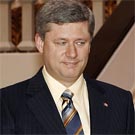Submitted by Levon Sevunts on Wed, 10/15/2008 - 04:23.

Montreal – Prime Minister Stephen Harper came within a stone's throw of a majority government Tuesday as Canadians re-elected a minority Conservative government.
Early returns showed Conservatives elected or leading in 143 ridings, which would be a gain of 16 seats. The opposition Liberals were elected or leading in 75 ridings.
The separatist Bloc Quebecois, which runs candidates only in the French-speaking province of Quebec, was leading in 49 ridings, and the socialist New Democratic Party was leading in 38 ridings.
The Green Party, which got 6.4 per cent of the popular vote, once again failed to elect a single parliamentarian in Canada's first-past-the-post system, in which single winners are elected in each constituency.
There were three independent candidates elected to the House of Commons.
Conservatives came just a few seats short of the 155 they needed to form a majority government in the 308-seat House of Commons.
The Conservatives got 37 per cent of the popular vote, the Liberals 28, the New Democrats 19 per cent and the Bloc Quebecois 9 per cent.
The results come as a blow to Liberal leader Stephane Dion, who by most accounts ran a lackluster campaign.
In the previous Parliament, Conservatives held 127 seats, the Liberals 95, the Bloc Quebecois 48, the New Democrats 30 and independents four. Four seats were vacant.
The Conservatives had come within reach of a majority government early in the election campaign, but Harper, the first world leader to face an election since the outbreak of the financial crisis, was hurt by his perceived aloofness and slow response to the economic downturn.
The campaign started well for the Conservatives. Polls showed Harper enjoying a strong lead in leadership qualities over his rivals. His political handlers tried to soften Harper's image, telling him to ditch his trademark business suits in favour of sweaters and sports jackets. Harper ran on a promise of a family-friendly but fiscally responsible government.
He skillfully defused a potential political minefield by pledging to withdraw Canadian troops from Afghanistan in 2011 after their current mandate expires.
Throughout his two and half years as prime minister, Harper had courted Quebec nationalist votes by, among other things, recognizing the majority French-Canadian province as a nation and visibly improving his own command of the French language.
By contrast, his main opponent, Dion, already handicapped by his mediocre command of English, has had great difficulty in selling his complicated Green Shift carbon tax programme to reduce greenhouse gases to a skeptical population already reeling from record-high fuel prices.
Then two weeks into the campaign, the wheels started coming off the tightly run Conservative campaign.
A Conservative announcement of relatively minor cuts to arts and culture funding and a pledge to introduce tougher sentences for young offenders suddenly backfired in Quebec, where culture is seen as key to maintaining the province's distinct French-Canadian identity.
Then a number of embarrassing revelations, including an admission that a 2003 speech by Harper in support of the highly unpopular war in Iraq had plagiarized sections of an address by then-Australian prime minister John Howard, chipped away at Tory support even further.
With the financial crisis savaging world economies, Harper's assurances that the fundamentals of the Canadian economy were solid and that there are "probably some great buying opportunities" in the stock market sounded out of touch with the jittery mood of the country. The opposition pounced on Harper, and the Conservative campaign seemed in freefall.
But by Saturday, the Tories managed to stop the haemorrhaging and even picked up support.
Yet while the Tories made significant gains in parts of Ontario, their campaign in Quebec has run into major difficulties and instead of gaining seats, the Conservatives lost a seat to the resurgent Bloc Quebecois. (dpa)